Meng Xi
E2PL: Effective and Efficient Prompt Learning for Incomplete Multi-view Multi-Label Class Incremental Learning
Jan 23, 2026Abstract:Multi-view multi-label classification (MvMLC) is indispensable for modern web applications aggregating information from diverse sources. However, real-world web-scale settings are rife with missing views and continuously emerging classes, which pose significant obstacles to robust learning. Prevailing methods are ill-equipped for this reality, as they either lack adaptability to new classes or incur exponential parameter growth when handling all possible missing-view patterns, severely limiting their scalability in web environments. To systematically address this gap, we formally introduce a novel task, termed \emph{incomplete multi-view multi-label class incremental learning} (IMvMLCIL), which requires models to simultaneously address heterogeneous missing views and dynamic class expansion. To tackle this task, we propose \textsf{E2PL}, an Effective and Efficient Prompt Learning framework for IMvMLCIL. \textsf{E2PL} unifies two novel prompt designs: \emph{task-tailored prompts} for class-incremental adaptation and \emph{missing-aware prompts} for the flexible integration of arbitrary view-missing scenarios. To fundamentally address the exponential parameter explosion inherent in missing-aware prompts, we devise an \emph{efficient prototype tensorization} module, which leverages atomic tensor decomposition to elegantly reduce the prompt parameter complexity from exponential to linear w.r.t. the number of views. We further incorporate a \emph{dynamic contrastive learning} strategy explicitly model the complex dependencies among diverse missing-view patterns, thus enhancing the model's robustness. Extensive experiments on three benchmarks demonstrate that \textsf{E2PL} consistently outperforms state-of-the-art methods in both effectiveness and efficiency. The codes and datasets are available at https://anonymous.4open.science/r/code-for-E2PL.
SatFusion: A Unified Framework for Enhancing Satellite IoT Images via Multi-Temporal and Multi-Source Data Fusion
Oct 09, 2025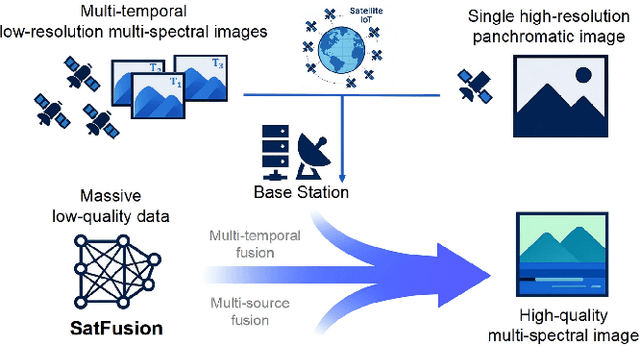
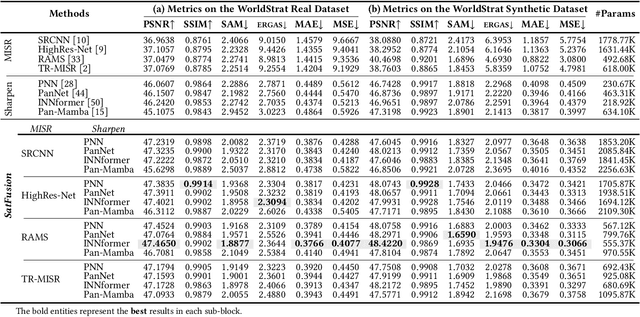
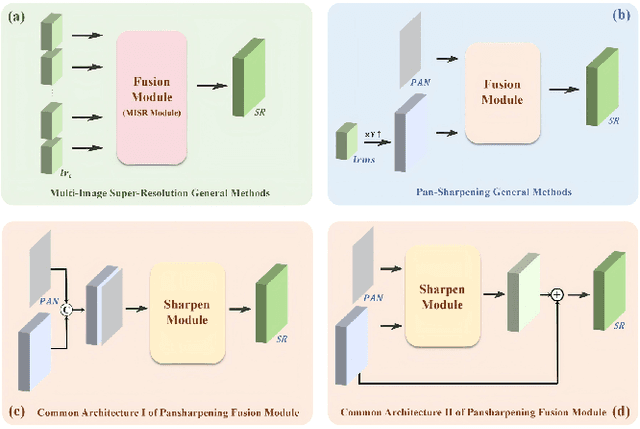
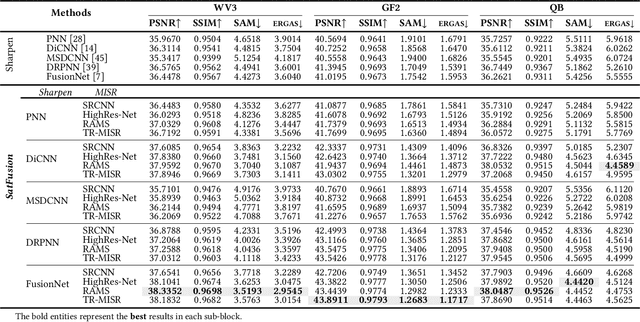
Abstract:With the rapid advancement of the digital society, the proliferation of satellites in the Satellite Internet of Things (Sat-IoT) has led to the continuous accumulation of large-scale multi-temporal and multi-source images across diverse application scenarios. However, existing methods fail to fully exploit the complementary information embedded in both temporal and source dimensions. For example, Multi-Image Super-Resolution (MISR) enhances reconstruction quality by leveraging temporal complementarity across multiple observations, yet the limited fine-grained texture details in input images constrain its performance. Conversely, pansharpening integrates multi-source images by injecting high-frequency spatial information from panchromatic data, but typically relies on pre-interpolated low-resolution inputs and assumes noise-free alignment, making it highly sensitive to noise and misregistration. To address these issues, we propose SatFusion: A Unified Framework for Enhancing Satellite IoT Images via Multi-Temporal and Multi-Source Data Fusion. Specifically, SatFusion first employs a Multi-Temporal Image Fusion (MTIF) module to achieve deep feature alignment with the panchromatic image. Then, a Multi-Source Image Fusion (MSIF) module injects fine-grained texture information from the panchromatic data. Finally, a Fusion Composition module adaptively integrates the complementary advantages of both modalities while dynamically refining spectral consistency, supervised by a weighted combination of multiple loss functions. Extensive experiments on the WorldStrat, WV3, QB, and GF2 datasets demonstrate that SatFusion significantly improves fusion quality, robustness under challenging conditions, and generalizability to real-world Sat-IoT scenarios. The code is available at: https://github.com/dllgyufei/SatFusion.git.
Lossless Privacy-Preserving Aggregation for Decentralized Federated Learning
Jan 08, 2025



Abstract:Privacy concerns arise as sensitive data proliferate. Despite decentralized federated learning (DFL) aggregating gradients from neighbors to avoid direct data transmission, it still poses indirect data leaks from the transmitted gradients. Existing privacy-preserving methods for DFL add noise to gradients. They either diminish the model predictive accuracy or suffer from ineffective gradient protection. In this paper, we propose a novel lossless privacy-preserving aggregation rule named LPPA to enhance gradient protection as much as possible but without loss of DFL model predictive accuracy. LPPA subtly injects the noise difference between the sent and received noise into transmitted gradients for gradient protection. The noise difference incorporates neighbors' randomness for each client, effectively safeguarding against data leaks. LPPA employs the noise flow conservation theory to ensure that the noise impact can be globally eliminated. The global sum of all noise differences remains zero, ensuring that accurate gradient aggregation is unaffected and the model accuracy remains intact. We theoretically prove that the privacy-preserving capacity of LPPA is \sqrt{2} times greater than that of noise addition, while maintaining comparable model accuracy to the standard DFL aggregation without noise injection. Experimental results verify the theoretical findings and show that LPPA achieves a 13% mean improvement in accuracy over noise addition. We also demonstrate the effectiveness of LPPA in protecting raw data and guaranteeing lossless model accuracy.
A Latent Feelings-aware RNN Model for User Churn Prediction with Behavioral Data
Nov 06, 2019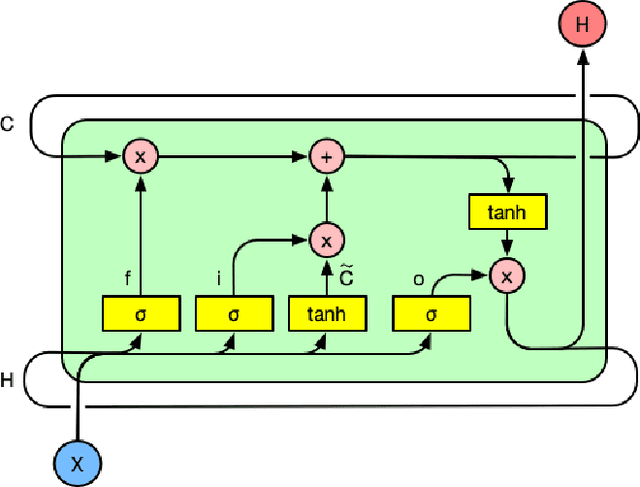
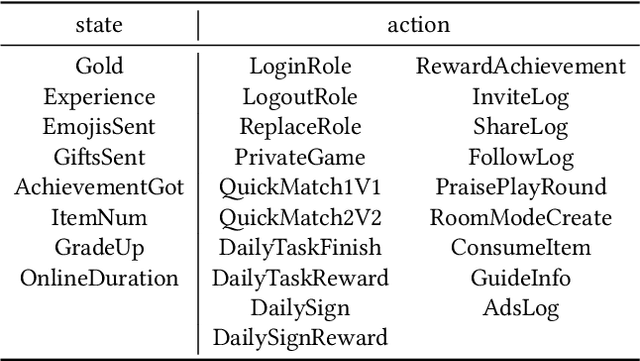
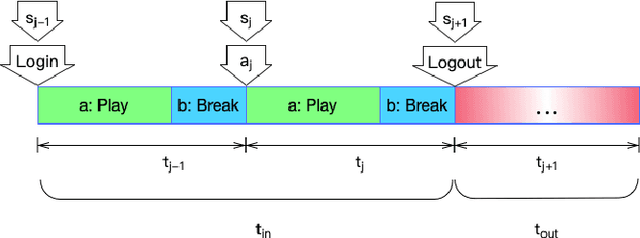
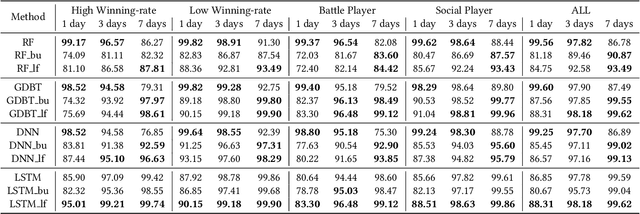
Abstract:Predicting user churn and taking personalized measures to retain users is a set of common and effective practices for online game operators. However, different from the traditional user churn relevant researches that can involve demographic, economic, and behavioral data, most online games can only obtain logs of user behavior and have no access to users' latent feelings. There are mainly two challenges in this work: 1. The latent feelings, which cannot be directly observed in this work, need to be estimated and verified; 2. User churn needs to be predicted with only behavioral data. In this work, a Recurrent Neural Network(RNN) called LaFee (Latent Feeling) is proposed, which can get the users' latent feelings while predicting user churn. Besides, we proposed a method named BMM-UCP (Behavior-based Modeling Method for User Churn Prediction) to help models predict user churn with only behavioral data. The latent feelings are names as satisfaction and aspiration in this work. We designed experiments on a real dataset and the results show that our methods outperform baselines and are more suitable for long-term sequential learning. The latent feelings learned are fully discussed and proven meaningful.
 Add to Chrome
Add to Chrome Add to Firefox
Add to Firefox Add to Edge
Add to Edge